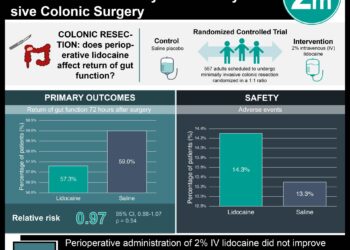Radiofrequency ablation of lung metastases may prolong survival
1. In patients with colorectal cancer lung metastases, radiofrequency ablation (RFA) provided favorable long-term survival with few severe adverse events.
2. A high carcinoembryonic antigen (CEA) value prior to RFA and the presence of viable extrapulmonary recurrences at the time of RFA were independent negative predictors of long-term survival.
Evidence Rating Level: 3 (Average)
Study Rundown: Colon cancer is the third most common cancer and the second most common cause of cancer-related mortality in the United States. Distant spread is common, and 10-30% of patients with colon cancer have pulmonary metastasis at presentation. Such patients often require multiple surgeries because not all the metastatic disease is detectable at first presentation and because of the high likelihood of recurrence. Furthermore, surgical lung resection may not be possible in patients with certain comorbidities such as severe chronic obstructive pulmonary disease, as metastasectomy carries the risk of complications including bleeding, pulmonary edema, and can result in prolonged recovery periods. Newer, less invasive therapies have been explored to treat patients with pulmonary metastases in an effort to improve long-term survival and quality of life in patients who are not candidates for surgery. Radiofrequency ablation (RFA) is one such technique, and it is associated with favorable local control rates in patients with pulmonary metastases from colorectal cancer. While the short- to mid-term survival data after RFA are promising, long-term survival data remain sparse and was the investigative focus of the present study.
The investigators reviewed patient outcome following the RFA with the primary endpoint being patient survival and explored possible factors associated with survival. The results suggest that RFA of colorectal lung metastases showed clinically significant benefits for long-term survival in the study group with low adverse events incidence. Independent prognostic factors that were negatively associated with long-term survival included CEA level before RFA and the presence of viable extrapulmonary recurrences at the time of procedure. The primary limitation of the study was its retrospective methodology and reliance on inconsistent and incomplete records, as not all imaging were studies were confirmed histopathologically for each patient. Future prospective, controlled trials are necessary to validate these findings in a larger patient cohort.
Click to read the study in the Journal of Vascular and Interventional Radiology
Relevant Reading: Radiofrequency ablation as treatment for pulmonary metastasis of colorectal cancer
In-Depth [retrospective cohort]: This retrospective study involved the analysis of 84 patients treated with RFA for pulmonary metastases from colorectal cancer from June 2001 to December 2012. Patient records were reviewed for local tumor progression and adverse events, alongside any prognostic factors associated with survival. There were a combined total of 172 metastases and 113 RFA sessions within the cohort. Overall, the medial survival time was 67 months in the cohort, with a median follow-up interval of 37.5 months. The estimated overall survival rates were 95.2%, 65.0%, and 51.6% at 1, 3, and 5 years, respectively. Univariate and multivariate analyses determined that a CEA level of at least 5 ng/mL prior to RFA (P = 0.03) and the presence of viable extrapulmonary recurrences at the time of RFA (P = 0.001) were independent negative prognostic factors for overall survival. The local tumor progression rate was found to be 14.0% (24 of 172 tumors). Serious adverse outcomes occurred in two cases (1.8%), and there were no patient deaths.
More from this author: Incidental findings common with breast imaging, often benign, MRI superior to CT for liver cancer diagnosis, Radiologist recommendations often yield significant findings
Image: PD
©2014 2 Minute Medicine, Inc. All rights reserved. No works may be reproduced without expressed written consent from 2 Minute Medicine, Inc. No article should be construed as medical advice and is not intended as such by the authors, editors, staff or by 2 Minute Medicine, Inc.







